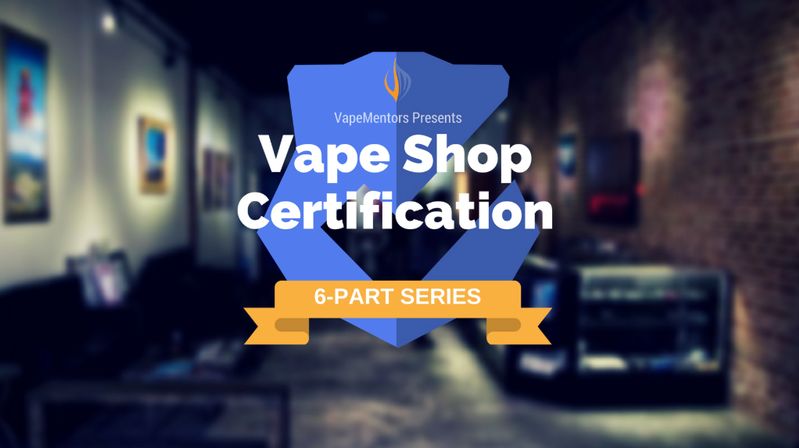Attention Vape Shop Owners
On August 8, 2016, the legal landscape for vape shop owners changed forever when the FDA announced its intention to deem ENDS products the same as tobacco products and regulate them as such. Fair or not, as a seller or manufacturer of ENDS products, your business is now subject to the Family Smoking Prevention and Tobacco Control Act of 2009 – and your time to comply with that Act is running out.
VapeMentors Is Here to Help
If you’ve ever taken a look at the list of FDA regulations for the vape industry, it’s enough to make your head spin. The regulations are buried in page after page of confusing legalese, and finding an actionable list that tells you what you need to do in simple terms often feels impossible – so that’s what we’ve done here. On this page, you’ll find a simple overview of the regulations that you now face. Is your vape shop in full compliance with FDA regulations? Sign up now for our FREE FDA regulation mini-course and get up to speed on the things that you need to do to avoid an FDA warning letter or fine. We’ve broken the regulations down in simple terms so you can spend less time worrying about compliance and more time running your business.
Before We Begin: The Silver Lining
Before we go into the full list of FDA regulations for vape shops and manufacturers, we’d like to begin with a small bit of potentially good news. As soon as the FDA announced its deeming regulations for the vape industry in 2016, lawsuits began to pile up challenging the legality of the FDA treating ENDS products the same as tobacco products in spite of mounting scientific evidence showing that the potential health implications are drastically different. The lawsuits also point out what an unfair burden the PMTA process is for the hundreds of small businesses across the country that now support and earn revenue from the vape industry. Nothing will change, though, unless those lawsuits are successful – and until they are, the regulatory framework described in this article represents the new normal for companies in the vape industry – so you’ll need to learn to live by them. Let’s begin!
FDA Regulations for ENDS Retailers
Any business selling ENDS products online or offline qualifies as an ENDS retailer. That’s true even if your business is a convenience store or gas station, and ENDS products represent only a small percentage of what you sell.
Your company is an ENDS retailer if you sell finished ENDS products in retail packaging bearing other companies’ logos. If your products bear your own logo – even if those products come from third-party factories and laboratories – you are an ENDS manufacturer. If you both sell and manufacture ENDS products, you must comply with all of the regulations in this article.
All FDA regulations for ENDS retailers are in effect now. To avoid a warning letter or fine from the FDA, you must immediately comply with all of the below regulations. The FDA is sending undercover inspectors to ENDS retailers across the country now. Click here to learn how you can prepare.
Refuse All Vape Sales to Minors
As of August 8, 2016, sales of ENDS products to minors are illegal nationwide. FDA law requires you to request photo identification from all customers aged 27 and younger. If a customer isn’t over 18 – or the
legal age in your state for buying nicotine – you must refuse the sale. Across the country, the FDA is conducting unannounced inspections of vape shops, and the primary reason for conducting those checks is to confirm that shops aren’t selling products to minors.
Do Not Offer Free Samples of Vape Products
The FDA deeming regulations of 2016 strictly prohibit the distribution of free samples of ENDS products. The prohibition doesn’t only include liquid samples; it also includes accessories such as tanks and coils. If you want to give customers a way to sample products before buying them, you’ll need to charge a small sampling fee to stay within the requirements of the regulations. You can find more information in this official document from the FDA.
Here’s a video from our Facebook page that explains in more detail >>>
NOTE: Check your state’s laws before offering fee-based liquid samples. Some states forbid the sale of nicotine liquid in any quantity smaller than that of a full retail bottle or pack of pods/cartridges.
Display Nicotine Warnings on Product Packages, Displays and Advertisements
The FDA requires you to display prominent nicotine warnings on all liquids and all hardware that customers are likely to use with nicotine. The required warning text is “WARNING: This product contains nicotine. Nicotine is an addictive chemical.” If you sell liquids with nicotine, then the warning should also appear on nicotine-free liquids because there is a chance that users might mix the two. We describe the requirements for nicotine warnings in greater detail in this article. The grace period for having your nicotine warnings in place has already passed. At this point, you should no longer sell any ENDS product – or accept any product from your distributors – that doesn’t display the warning.
Choose Your Value-Added Services Carefully
Repeat business is something that helps to ensure the long-term success of your vape shop – and value-added services are great for encouraging customers to keep coming back. If you don’t manufacture your own devices or liquids, though, you must avoid offering services that would make the FDA consider your company a manufacturer rather than a retailer. Manufacturers are subject to an entirely different set of regulations. We’ll discuss those shortly.
As vape shop, you are free to perform general maintenance on ENDS devices without modifying the functionality of those devices. For example, you can:
- Assemble the components in a vape starter kit for a customer
- Replace a coil in a tank with an identical coil
- Clean or repair a device or tank
- Perform maintenance tasks such as replacing o-rings or glass enclosures
In each of the above scenarios, you’re fixing, maintaining or setting up a complete, branded ENDS device or accessory exactly as it arrived from the factory. If you change something about the device or
accessory, you become a manufacturer. Some services that wouldn’t be allowed for vape shops include:
- Assembling a tank and device that weren’t sold together as a single kit
- Building an RDA coil
- Modifying a device or tank for any reason, such as to improve performance
If you do any of those things, you’re a manufacturer and are subject to FDA regulations for ENDS manufacturers. You can find additional guidance in this official FDA document.
Refer to this video that explains it in more detail (and a possible loophole) >>>
Restrict Physical Access to Vape Products Except in Adults-Only Facilities
The FDA prohibits the sale of ENDS products through vending machines and self-service displays except in adults-only facilities – such as bars – that check patrons’ ID at the door. In a standard shop, employees must retrieve ENDS products for customers. Note that many states also have their own laws about vending machines and self-service displays; you’ll also need to abide by the applicable laws for your state.
FDA Regulations for ENDS Manufacturers
One of the most confusing aspects of the FDA’s regulations for ENDS manufacturers is determining exactly who qualifies as a manufacturer. Your business may qualify as a manufacturer even if you don’t put your logo on a single ENDS product. You’ll need to abide by these FDA regulations for ENDS manufacturers if your business:
- Offers a “juice bar” in which you blend custom liquids for customers on demand
- Bottles liquids for shipment or sale in your shop – even if you’re re-bottling or putting your own logo in liquids received from outside laboratories
- Builds coils for rebuildable atomizers
- Modifies existing ENDS devices
- Opens and refills pods or cartridges for closed-system ENDS devices
Get this free quick reference guide about manufacturing practices to avoid >>>
*If you don’t do any of these activities in your shop, you can skip to the bottom of this article now.
Introduce No New Products After August 8, 2016
The FDA deeming regulations froze the current state of the vape market on August 8, 2016. Any ENDS product available on that date can remain on the market pending that product’s PMTA application. For any product released after that date, a completed PMTA and marketing order from the FDA must already be in place. At the time of writing, no ENDS manufacturer has completed the PMTA process for any product. Therefore, one of these scenarios must apply to your company.
- All of your products were already available on August 8, 2016. You are in compliance. If an FDA inspector visits your establishment, you should be able to provide paperwork proving that your products were available before the deeming regulations were in place.
- You released products after August 8, 2016. You are not in compliance. You must either submit PMTAs for those products or remove them from the market to avoid potential fines.
Add Nicotine Warnings to Your Product Packaging
As we mentioned above, virtually all ENDS products now require prominent nicotine warnings. As a manufacturer, the primary responsibility for complying with that regulation lies with you. We describe the requirements for ENDS nicotine warnings in detail at this link.
Submit Your Product Listing to the FDA
The FDA required all manufacturers of ENDS products to register their companies and submit listings of their products by October 12, 2017. You were also required to update your product listings on June 30, 2018 and will need to submit your yearly registration by December 31, 2018. The FDA provides instructions for submitting your product listings online in this document. The product listing must include your labeling and advertisements.
Submit Your Product Ingredients to the FDA
The FDA requires full ingredient listings for all ENDS products. The ingredient listings for large ENDS manufacturers were due on May 8, 2018. The ingredient listings for small-scale manufacturers are due on November 8, 2018. What’s the difference? If you employ more than 150 full-time workers or earn more than $5 million in yearly revenue, you’re a large manufacturer, and your ingredient listings are past due. This page provides guidance from the FDA on how to submit your ingredient listings in the most efficient manner possible.
Submit Test Results for HPHCs
If your company manufactures liquids, you’ll need to test your products for Harmful and Potentially Harmful Constituents and submit a report of your findings by November 8, 2019. Find guidance from the FDA at this link. Some of the substances that you’ll need to test for include arsenic, cadmium, benzene and formaldehyde. Although testing your products for HPHCs won’t be cheap, the good news is that you don’t really need to understand the scientific minutiae. Analytical laboratories around the country know that 2019 will be an important year for ENDS liquid makers, and they’re already gearing up to run the suite of tests that the FDA requires. By next year, several labs will be competing for your business.
Submit PMTAs for Your Products
The Pre-Market Tobacco Application process is the most burdensome and expensive portion of the new regulations for ENDS manufacturers. Find the full FDA guidance on the PMTA process here. The bad news about the PMTA process is that it may cost hundreds of thousands of dollars per application – and you’ll need to submit an application for each product that you make. To date, only one company – Swedish Match, a snus maker – has made it through the PMTA process successfully. The application was 120,000 pages in length – or about four times the volume of an encyclopedia.
The good news about the PMTA process is that the FDA has delayed the deadline for submissions from ENDS manufacturers until August 8, 2022. If you get your applications in by the deadline, you can continue selling your products until you receive a response from the FDA. Representatives of the FDA have also said that they are working to make the PMTA process easier to understand and less burdensome for small businesses.
Get Your Employees Trained In The Vape Shop Certification Course Now
The Vape Shop Certification program from VapeMentors gives your shop a turn-key solution to employee training you won’t find anywhere else.
Watch Module I For Free Here >>>
When you complete our certification program, you’ll learn:
- How to align your vape shop operation more closely with FDA regulations
- How to train your new and existing employees to comply with federal and state laws
- How to automate record keeping for your employee training sessions
- How to ensure that you’re always prepared for an unannounced FDA “mystery shopper” inspection
By joining this program, you’ll also receive FREE access to lifetime regulatory updates. We track all state and federal laws relating to the ENDS industry, and we’ll keep you abreast of any changes.
 **DISCLAIMER**: VapeMentors is not offering legal advice in this article or on our website. While we strive to keep the information completely accurate, we strongly encourage that you verify for yourself any information on this page before making decisions that could impact your business. The FDA changes policies and guidance regularly.
**DISCLAIMER**: VapeMentors is not offering legal advice in this article or on our website. While we strive to keep the information completely accurate, we strongly encourage that you verify for yourself any information on this page before making decisions that could impact your business. The FDA changes policies and guidance regularly.

Jesse is the Digital Marketing Director at VapeMentors and Chief Technology Mentor. He is an ecommerce and internet marketing expert with a background in business and technology.
